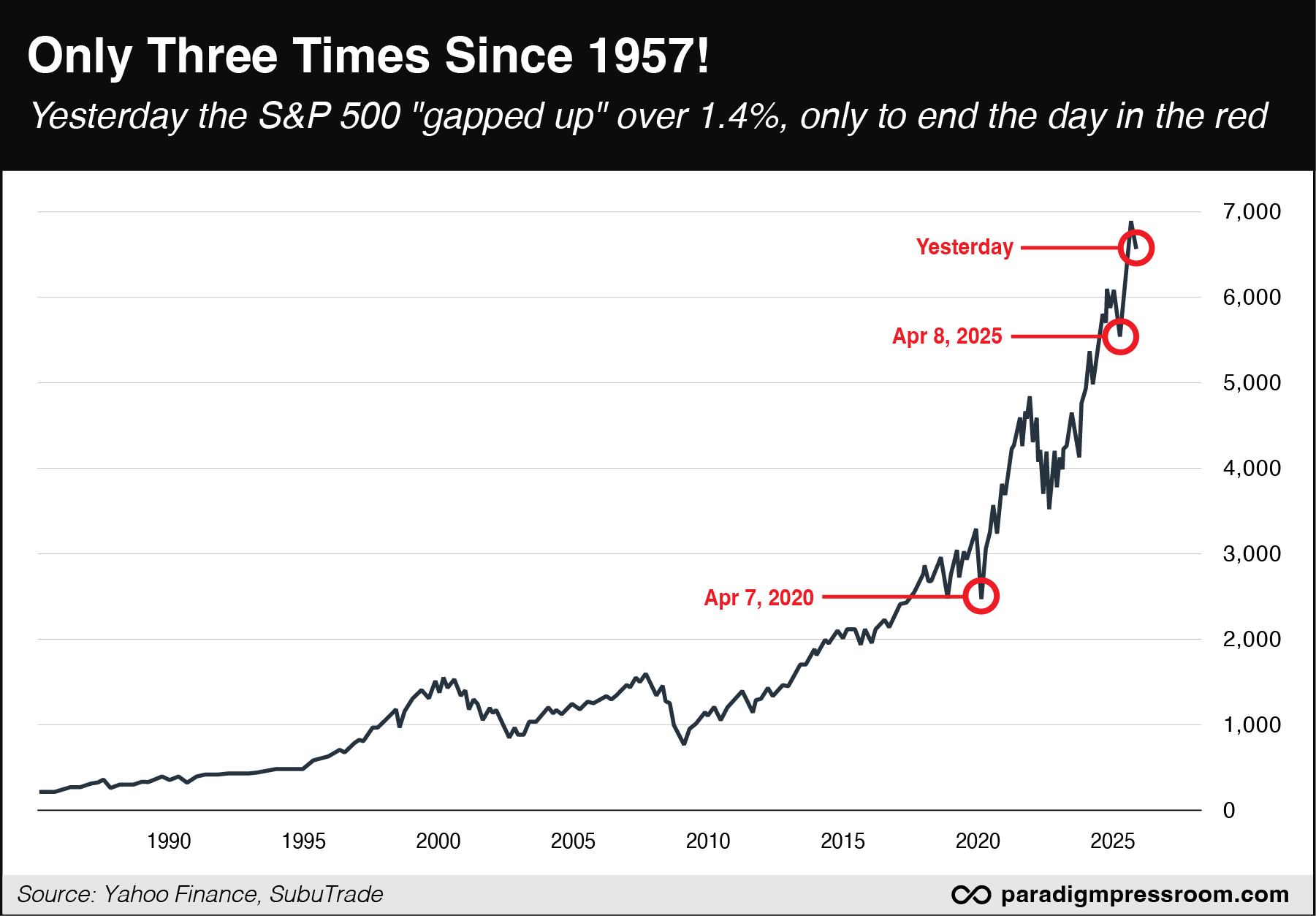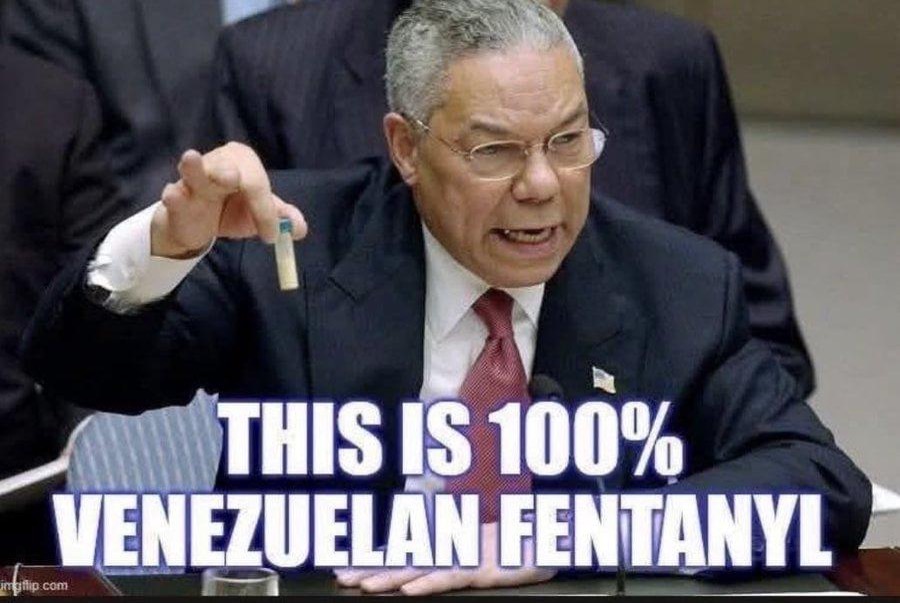Only 3X in Market History…
![]() The Day After the “Whoosh”
The Day After the “Whoosh”
 Yesterday’s action in the stock market was something that normie Americans barely noticed.
Yesterday’s action in the stock market was something that normie Americans barely noticed.
A 1.6% drop in the benchmark S&P 500? Not pleasant, but also nothing out of the ordinary.
 But finance pros are agog at what happened.
But finance pros are agog at what happened.
If you were with us yesterday, you’ll recall the major averages “gapped” higher on the heels of Nvidia’s stellar earnings numbers — leaping big-time relative to Wednesday afternoon’s close.
But by the time we hit “send,” the air was already coming out. At day’s end, the market was deep in the red.
“It was only the THIRD TIME since 1957 that the S&P 500 gapped up more than +1.4% and then closed negative,” says Paradigm trading pro Enrique Abeyta.
And the only other times were very recent — amid COVID in April 2020 and the tariff scare in April of this year.
 Which is all interesting, for sure. But how useful is it?
Which is all interesting, for sure. But how useful is it?
The great thing about working with Enrique is that he digs into data sources that mine actionable information from otherwise silly factoids.
So according to Subu Trade, here’s what happened those other two times the S&P gapped up over 1.4% and ended the day in the red: Both times the market was in the green the next day… the next week… and the next month.
You can make it out easily on this long-term chart of the S&P…

In 2020, the S&P was up 8.3% a month after the “gap and crap” day… and earlier this year the one-month gain was an even more impressive 13.7%.
Here are some more numbers to geek out on: “It was only the FOURTH TIME we have seen the S&P 500 gap up more than 1.4% and then close down more than 1.5%,” Enrique tells us.
What happened after that? According to figures from TheMarketStats, in each instance the market was up a week later. And on two of those three occasions — October 2008 and April 2025 — it was up one month later.
“Ask yourself,” Enrique urges: “Is the current environment more like six months ago or more like when Lehman went bankrupt and housing was collapsing?
“THAT answer will tell you what to do next. We think it is obvious — 2025! That means BUY THE DIP!”
 Sure enough, Mr. Market is staging a rebound going into the weekend.
Sure enough, Mr. Market is staging a rebound going into the weekend.
At last check, the S&P 500 is up three quarters of a percent to 6,588. For the record, yesterday’s action finally delivered a 5% pullback from all-time highs for the first time since April. Reminder: A 5% pullback is normal!
Relative to the S&P the Nasdaq’s gain today is weaker, the Dow’s stronger.
Gold is holding its own at $4,078 but the action in silver has been wild — plunging to $48.60 at one point, but now back within a few pennies of $50. Crude has sunk 2% — a barrel of West Texas Intermediate back under $58 for the first time in a month.
Ugly doesn’t even begin to describe the action in crypto — Bitcoin approaching $83,000 for the first time since April and Ethereum just over $2,700.
![]() Follow-Ups
Follow-Ups
 The Trump administration’s latest foray into the energy-and-critical-minerals space is a $1 billion federal loan to restart the Three Mile Island nuclear plant in Pennsylvania.
The Trump administration’s latest foray into the energy-and-critical-minerals space is a $1 billion federal loan to restart the Three Mile Island nuclear plant in Pennsylvania.
Of course, Three Mile Island was the site of an infamous accident in 1979. But only one of the reactors was damaged. The other remained in operation until 2019, when it was mothballed.
Last year, Constellation Energy (CEG) struck a deal with Microsoft: The undamaged reactor would be restarted, providing electricity exclusively to Microsoft data centers for 20 years beginning in 2027.
The Energy Department says Constellation could follow through on its contract without a federal loan — but the taxpayer backstop would help lower electricity prices for customers on the PJM Interconnection. That’s the country’s biggest grid operator, serving 65 million people in 13 states.
“What’s important for the administration is to show support for affordable, reliable, secure energy in the U.S.,” says Energy Department senior adviser Greg Beard. “This loan to Constellation will lower the cost of capital and make power cheaper for those PJM ratepayers.”
Gee — are homeowners going to see an itemized discount on their electric bill? Just asking!
 The drama over the Chinese-owned chip maker Nexperia is over — and it’s not an overstatement to say it’s ended in humiliation for the West.
The drama over the Chinese-owned chip maker Nexperia is over — and it’s not an overstatement to say it’s ended in humiliation for the West.
As we chronicled last month, the Dutch government nationalized Nexperia’s operations there — under considerable pressure from Washington.
But because 80% of Nexperia’s Dutch product is sent to China for packaging and testing, Beijing had ample leverage — which it exercised by barring exports of the firm’s product from China. Volkswagen and Volvo, among others, were at risk of shutting down their assembly lines for lack of chips.
On Wednesday the Dutch government said it would suspend its decision after “constructive talks” with Beijing. For all intents and purposes, the government un-seized Nexperia and returned control to its Chinese owner.
![]() D.C. Won’t Take Yes for an Answer (Venezuela)
D.C. Won’t Take Yes for an Answer (Venezuela)
 “U.S. Military Aircraft Confirmed to Have Flown Near Venezuela,” says a BBC headline.
“U.S. Military Aircraft Confirmed to Have Flown Near Venezuela,” says a BBC headline.
Relying on flight-tracking data, the Beeb reports that four U.S. military aircraft buzzed the Venezuelan coast last night. “These include a long-range bomber, a surveillance aircraft, a fighter jet and a refueling tanker.” The aircraft belong to a huge naval and aircraft fleet massed off Venezuela, led by the aircraft carrier USS Gerald Ford.
“I do not believe the U.S. can sustain this magnitude of force projection at a high state of readiness for more than a few days,” tweets the military analyst William Schryver. “They either have to start the party or turn out the lights and go home.”
As we chronicled in Tuesday’s edition, the drug trade is merely a pretext for war. If war comes — and that is still far from certain — it will be at the behest of powerful special interests that stand to profit from a successful regime change.
 The peculiar thing is that Venezuela’s President Nicolas Maduro has already offered Washington access to his country’s vast natural resources, in hopes of avoiding war.
The peculiar thing is that Venezuela’s President Nicolas Maduro has already offered Washington access to his country’s vast natural resources, in hopes of avoiding war.
Last month, The New York Times reported that Venezuelan officials “offered the Trump administration a dominant stake in Venezuela’s oil and other mineral wealth in discussions that lasted for months, according to multiple people close to the talks…
“Under a deal discussed between a senior U.S. official and Mr. Maduro’s top aides, the Venezuelan strongman offered to open up all existing and future oil and gold projects to American companies, give preferential contracts to American businesses, reverse the flow of Venezuelan oil exports from China to the United States and slash his country’s energy and mining contracts with Chinese, Iranian and Russian firms.”
Maduro’s government has also continued accepting U.S. deportation flights — by one count, more than 10,000 Venezuelans since February.
And yet it seems the Trump administration refuses to take yes for an answer. It cut off all talks in early October.
Shades of the run-up to the Iraq War in 2002–03: After the war was underway we learned Saddam Hussein was willing to give the Bush administration essentially everything it wanted — everything except giving up power.
 If war does not come, it will be because the Trump administration feels it lacks the consent of the governed in this country.
If war does not come, it will be because the Trump administration feels it lacks the consent of the governed in this country.
On that score, Reuters/Ipsos finds only 21% of Americans support using the U.S. military to oust Maduro. An earlier survey by YouGov came up with a similar number — 18%.
On a related question leaving Maduro out of the equation — “Would you support or oppose the U.S. using military force to invade Venezuela?” — a majority of respondents to the YouGov survey said they’re opposed (55%), including a plurality of Republicans (38%).
Incredibly, support among Republicans for sending Navy ships to the waters around Venezuela declined between September and October.
The America First faction of Trump’s base — already angry about his support for Israel and his flip-flops on Ukraine — wants nothing to do with it. And they’re posting memes like this, harking back to early 2003…

And so the U.S. armada sits off Venezuela, planes buzzing the coast.
“I believe they may be attempting to goad the Venezuelans into firing on them in order to establish a ‘they struck first’ pretext to then unleash a massive attack,” says the aforementioned William Schryver.
“I doubt the Venezuelans will oblige them, and sooner or later the U.S. will have to do ‘something,’ or call the whole thing off.”
![]() Comic Relief
Comic Relief
 Gee, what was it we were saying in yesterday’s edition about how the mainstream still doesn’t “get” gold?
Gee, what was it we were saying in yesterday’s edition about how the mainstream still doesn’t “get” gold?
But the meme-o-sphere does get it…

![]() Mailbag: Venezuela
Mailbag: Venezuela
 “Well said on Venezuela,” a longtime reader writes after Tuesday’s edition — which appears to be the most “liked” issue we’ve published in quite some time.
“Well said on Venezuela,” a longtime reader writes after Tuesday’s edition — which appears to be the most “liked” issue we’ve published in quite some time.
“Hard to tame that imperial impulse,” he adds. “How did ‘our oil’ get under their landmass anyway?”
 But I’d rather give space to some other perspectives — including one from a longtime reader who lives in nearby Ecuador.
But I’d rather give space to some other perspectives — including one from a longtime reader who lives in nearby Ecuador.
His note is too long to publish in full but he reminds us about the socialist mismanagement of Maduro and his predecessor Chavez.
Ecuador was flooded with refugees amid a wave of runaway inflation starting around 2016–17. “I recall refugees offering notes of 10,000 or 20,000 bolivares at traffic lights for any small change you cared to offer them. I have several I collected that way as souvenirs.” Our reader also knew a successful businessman who fled Venezuela as the regime blamed “greedy business owners” for its travails.
“It is absolutely true that Latin American governments do NOT like it when the U.S. tries to engineer regime changes anywhere south of the U.S. border, but while the protests would probably be loud should the U.S. try to overthrow Maduro et al., if the result were to be a Venezuela that was stable and safe, most Venezuelan refugees that I know would really prefer to return home, and the countries where they are now residing would be relieved to see them go.
“I do not share all this to advocate any particular position, but so that your readers may have a little better understanding of the situation. The refugees I have known personally are generally good people, struggling to survive when their lives were thrown into turmoil that most of us cannot comprehend.”
 Now a more forceful reply: “Wow, while I do agree with you most of the time, your commentary about Venezuela looks like something I would see on WaPo or CNBC.
Now a more forceful reply: “Wow, while I do agree with you most of the time, your commentary about Venezuela looks like something I would see on WaPo or CNBC.
“In time, we might be able to compare Venezuela with Iraq, but certainly not at this point. And how can you be so sure this is not about drugs? Are you getting intelligence briefings (pretty sure you're not)?
“But you are willing to take the word of a DEI liberal activist like Ms. Kwiatkowski (who also doesn't know anything). Could there be something else of vital importance happening there? The truth is you don't know, and so you should not act like you do know.
“Perhaps you are like many of the Demoncrats, apparently screaming about having their supply of cheap cocaine cut off? One has to wonder about the motives of someone so opposed to cutting off the supply of drugs to the U.S.”
Dave: My default position is to never trust the claims of government officials without evidence.
And no, it is not too soon to seek analogies to Iraq.
Retired Rep. John Duncan (R-Tennessee) was one of only six Republicans who voted against authorizing the Iraq War. “At the time,” he writes in the Miami Herald, “it was the most unpopular vote of my 30-year congressional career. But it has come to be my most celebrated…
“We now have decades of accumulated wisdom that misguided military ventures, be they outright invasions like Iraq or hybrid regime change wars like in Libya, only lead to catastrophe. I was one of the first Republicans in Congress to endorse Donald Trump for president in 2016 because he appeared to have learned these lessons.”
But Duncan is deeply concerned now.
“Unlike in 2002, the blowback of regime change in Venezuela would be in America’s own backyard. Ironically, a destabilized Venezuela would create the perfect conditions for the very organized criminal and narco-trafficking activities that the Trump administration seeks to combat. It could also trigger a new wave of Venezuelan migration.”
We’ll leave it there for the week. More about the potential fallout from a regime-change op next week.










